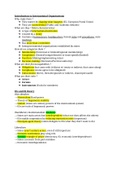Introduction to International Organisations
Why study them ?
➔ They matter by shaping what happens (EU, European Postal Union)
➔ They are controversial (Public and Academic debates)
What are they ? (Main characteristics)
➔ A type of international institution
➔ Created by a treaty
➔ Contains a bureaucracy, headquarters, formal rules and procedures, state
meetings
➔ Has more than 2 members
➔ Intergovernmental organizations established by states
How do we categorise them ?
➔ Membership (Universal or limited/regional membership)
➔ Competence (General/comprehensive or issue-specific/limited)
➔ Function (Making/implementing rules)
➔ Decision-making (Horizontal/Vertical authority)
What are their forces/capabilities ?
➔ Obligations that come with it (direct w/ treaty or indirect, that come along)
➔ Compliance (states agree to be obligated)
➔ Enforcement (direct, threaten/punish or indirect, shame/persuade)
What are their roles ?
➔ Actors
➔ Forums
➔ Instruments (Tools for members)
IOs and IR theory
(Neo-)Realism
→ Materialism/Hard-power
→ Theory of hegemonic stability
→ Statism (states are unitary powers of the international system)
→ IOs are tools of hegemonic powers
(Neoliberal-) Institutionalism (Keohane)
→ States are main actors but interdependent (what one does affects the others)
→ IOs enable cooperation by reducing transaction costs (important)
→ Principal-agent theory (states delegate to IOs what they don’t want to do)
Liberalism
→ States aren’t unitary actors, even if still important
→ Domestic institutions play a big role
→ Kantian triangle of peace (democracy, IO, economic interdependence)
→ States can learn from past mistakes
→ Economic interdependence
, → Shared values matter
Social Constructivism (Wendt)
→ Considered a meta-theory
→ ≠ only material interests/power matters
→ Norms, Ideas, Discourse and Culture are important
- Shaped by IOs
→ “Anarchy are what states make of it” (Wendt, 1999)
→ Important actors: Norm entrepreneurs, Advocacy networks, Epistemic communities
Critical theories
→ A critical POV of hegemonic powers and the international system, made to overcome
modern theories
→ Neo-marxism, post-colonialsm, feminism, neo-gramsciamism, world-systems theory
→ Argue that international system is shaped by international elites, economic system,
structures of production, masculinity
→ IOs embed imperial/patriarchal/capitalist structures
History of International Organization Research
What is global governance
❖ Informal and formal norms, procedures, ideas, values and institutions that help
actors of all size/shape address and solve trans-boundary problems
❖ New theoretical framework
Why is it criticised ?
❖ Supposedly neglected similar developments that took place earlier
❖ Analytically vague → about everything, can be hard to analyse decision-making
❖ Technical term → not revealing the politically problematic aspect that GG causes
❖ Western-centric
What are international institutions ?
❖ Body of norms, rules, practises that shape behaviour/expectations ≠ necessarily IO
❖ IOs operate within global governance as international institutions
International regimes ?
❖ Principles (Beliefs of facts, causation), Norms (standards of behaviour), Rules
(Prescriptions or proscriptions), decision-making procedures (Practises to
make/implement collective choices)
Example of international regime
❖ Nuclear Non-proliferation regime (Look at table)
Trends in the life of IOs
❖ Trends of existence
➢ Live a long time (15 IOs born b4 1895 lived 100 y)
➢ IOs born b4 WW1 live around 30 y ; After WWII around 15-20y
❖ Why do they die ?
➢ Expiration, dissolution, replacing, merging, disuse




